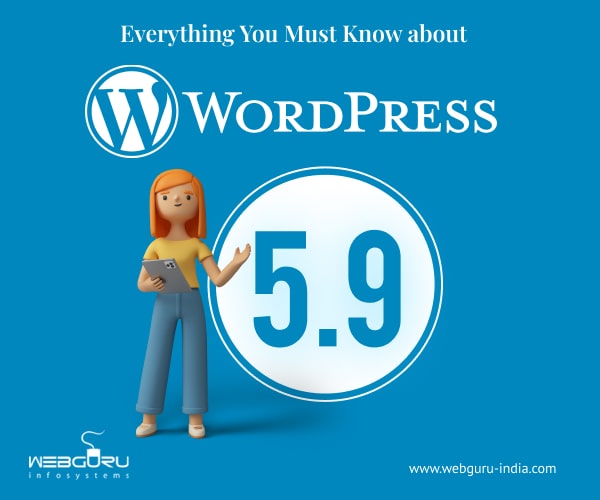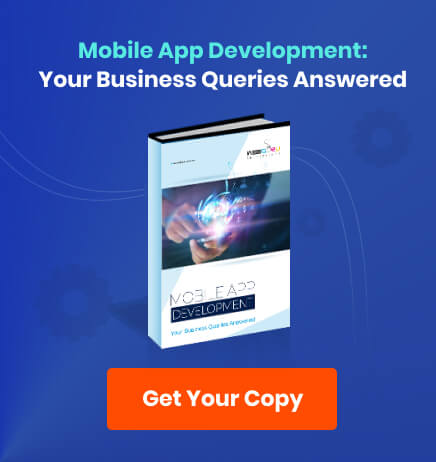Home Blog Website Development What’s New in WordPress 5.9: An Extensive Overview
What’s New in WordPress 5.9: An Extensive Overview
- 11 Mar / 2022
- 2,265 views

Released on 25th January 2022, WordPress 5.9 seeks to bring major changes in website development. Other than making the developers’ work easier, the version focuses on enhancing the website interface and improving the user experience. As a premium website development company, we take it upon ourselves to help you learn the features and functionalities introduced in WordPress 5.9. So, without further ado, let’s dive in.
New Features in WordPress 5.9: A Comprehensive List
New Theme
Every year, a new theme is introduced in WordPress and this year is no exception. The minimalistic design and lightweight theme, known as Twenty Twenty-Two, has instantly caught the audience’s attention. It is designed as the most flexible default WordPress theme so far. Thus it provides the users with immense control over each aspect of the design.
The theme has different customization options for colours, fonts, and other design elements. Further, one can use the readymade patterns of the theme while writing content. Full site editing capability makes the theme even easier to use. We will explore this in the next pointer.
Here’s how to activate the theme Twenty Twenty-Two:
- Click on Appearance
- Click Activate
That’s all, the latest theme is now enabled.
Full Site Editing
The full site editing feature is not a new thing. It was introduced in WordPress 5.8. However, this version builds on this feature. Various elements are introduced to enhance the site editing experience. Now, it’s easier to edit any WordPress theme and thus create a website with a unique and custom design. Here are a few exclusive features of full-site editing.
- Site-Wide Blocks
WordPress 5.9 will introduce 10 new blocks especially built for full site editing. You can find it under the Theme menu. Some of the theme blocks you can find in 5.9 are navigation, template part, footer, header, post author, next post, comments, term description, and archive title.
All these facilitate easy editing. You can add or remove any block to make changes to the website design.
- Block Style Change
With this site editor, you can make changes to the individual block styles used on a website. Click on the Style button and choose Blocks. You can see a list of blocks that can be edited and customized. Here you can set styles for individual blocks across the website. For example, you can change button colours so as to match your brand colours, modify heading font sizes, and so on.
As you can understand, the latest version of WordPress seeks to provide the users with an added level of control and capability to customize a website. You can hire WordPress developers to create a website with user-friendly features and functionalities.
- Add Site Wide Styles
Here, you can create a new style for your theme. Remember that it will be applied across the website. All you need is to click on the Style icon placed on the top right corner of the screen while editing any page or post. You can also change the colours and typography of the website from this menu.
Once you make a choice, you may save these changes for an individual template, parts of the template, or as the global style for the entire website.
- Edit Navigation Menu
In WordPress 5.9 the Menu feature is changed to ‘Navigation Menus’. Here, you can use the Navigation Menu block in the site editor to add items to it.
This block enables you to easily create navigation menus, adjust colours, add new links, modify alignment & spacing, and so on.
Improvements in Block Editor
A significant part of WordPress users is content creators. Also, businesses these days invest in WordPress development services as they focus on content creation. Therefore, WordPress’s recent release introduces new features in its block editor. Here are some of the useful features:
- Section Move
You can move sections directly from the ListView on the toolbar. All you need is to click on any item and simply move it up, down, or sidewise. Thus, you can easily readjust the layout by aligning different parts of the content.
- Enhanced Heading Control
The heading block enables the users to select a heading level from the vertical dropdown menu. Here, you can access the typography, margin, spacing, and design options for the headings.
- Improved Social Buttons & Icons
Earlier, it was a bit tricky to access controls of the child and parent blocks while working with social buttons and icons. In WordPress 5.9 child blocks can use the parent block’s toolbar. Also, you can now officially embed Pinterest.
- Rich URL Previews in the Block Editor
Earlier, when one hovered the mouse over a link in a post editor, he/she could only see the URL. But WordPress 5.9 fetches and displays rich URL previews for links inside a post editor.
This offers a sneak peek into the content of the URL and enhances the user experience. Also, it breaks the monotony of reading lengthy text content.
- Navigation Block
WordPress 5.9 lets one use the navigation block inside any WordPress page. Thus, you can manually create navigation menus in your landing pages and articles.
For example, you can use this feature to create a content table with links to different parts of an article.
Other Changes to the Block
Several options are introduced in the block so as to control it just the way you want. For instance, layout control helps you to determine justification and orientation. Dimensions control enables padding and block spacing.
You can also align the columns with the help of a column block. The cover blocks have a duotone filter and dimensions control with a minimum height of cover and padding. Gallery block and post featured image blocks further facilitate easy editing. A new block named Row block now appears in the line.
Select Language while Logging In
If multiple languages are installed on the WordPress website, users can select their preferred language on the login screen. This significantly enhances the user experience.
Changes for the Developers
- Better Compatibility with PHP 8.1
PHP 8.1 was released in November 2021. WordPress supports improved compatibility with PHP 8.1. However, you need to check if the theme or plugin is compatible with the latest version of PHP.
- Theme.json
Theme.json is a configuration file brought forth in WordPress 5.8 in order to control the block theme styles. WordPress 5.9 supports duo-tone filters and child themes in theme.json.
- New Filter Hooks
WordPress offers filter hooks to enable plugins to modify different types of internal data during runtime. A plugin can make changes to the given data by binding a callback to any specific filter hook. Once the filter is applied, every bound callback is run as per priority. Here are some of the newly added filter hooks
- display_login_language_dropdown
- is_post_type_vieweable
- is_post_status viewable
- default_template_types
- default_wp_template_part_areas
- wp_login_language_switcher_args
- rss_widget_feed_link
- wp_omit_loading_attr_threshold
And here are some of the newly added functions that developers can use:
- wp_is_block_theme
- wp_get_post_revisions_url
- wp_enqueue_block_style
- wp_list_users
- wp_json_file_decode
As you can see, while some of the features introduced in WordPress are easy-to-use by common people, some features require professional skills. Therefore, it’s better to engage a reputed website development company to equip your website with high-end features and functionalities.

Soumi Bhattacharya
Soumi Bhattacharya is an experienced content developer & keen observer of all things digital. Analyzing the latest trends in technology is her forte.
1 comment
Leave a Reply

-
1000+
Happy
Clients -
25+
Countries
Served -
19+
Years of
Trust







Very well explained. Thanks for sharing this.